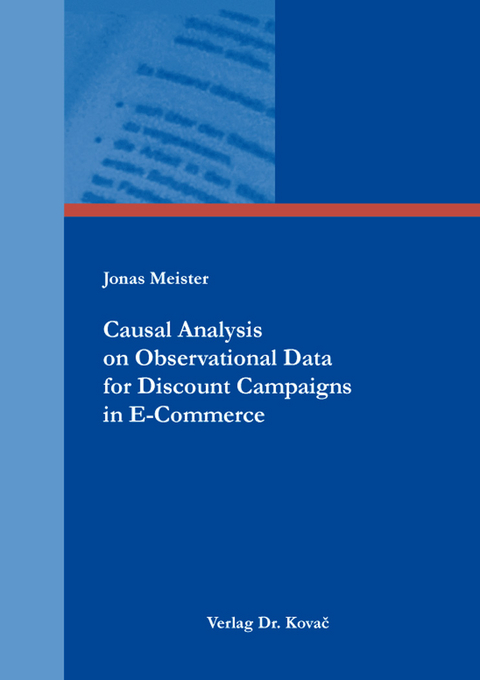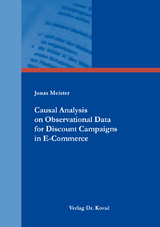Causal Analysis on Observational Data for Discount Campaigns in E-Commerce
Seiten
2023
|
1. Aufl.
Kovac, Dr. Verlag
978-3-339-13702-9 (ISBN)
Kovac, Dr. Verlag
978-3-339-13702-9 (ISBN)
Causal thinking is an inherent human behavior crucial for understanding relationships in diverse situations. Despite its significance, machine learning algorithms often struggle to identify causality, relying instead on historical patterns. This limitation hampers their ability to adapt to new scenarios, like the cold start problem.
Understanding causality holds particular importance in domains relying heavily on human behavior analysis, such as E-commerce, marketing, and advertisement. In these fields, the focus has shifted from predicting key performance indicators to measuring the impact of specific actions, like marketing campaigns.
To apply causality to E-commerce data, this thesis proposes a systematic approach. It begins by defining the necessary requirements, including an extensive data dictionary, followed by a three-phased combinatorial approach to infer causal relationships from observational data points. These relationships are then used to construct a causal network represented as directed acyclic graphs.
To demonstrate practical applicability, the CausaL Intelligent Scenario Planner (CLIP) is developed. CLIP serves as a campaign simulation tool and a means to build fundamental domain knowledge. Users can customize discount types, amounts, and affected articles to simulate campaign impacts. The analysis results are visually represented through directed acyclic graphs, revealing interrelationships and temporal offsets between features. Additionally, a second visualization compares factual and counterfactual courses, facilitating the understanding of intervention effects.
Evaluating the CLIP involves both qualitative and quantitative methods. The quantitative assessment gauges prediction accuracy based on precision and recall, considering time lags, and identifies the optimal time distance between interventions and their effects. Meanwhile, the qualitative evaluation entails a user survey with employees from a German sports retailer, evaluating the approach's usability and utility.
In conclusion, the three-phased approach significantly enhances the integration of causal analysis in the domain of E-commerce. A profound understanding of causality empowers decision-making across industries, enabling data-driven actions and better adaptation to novel circumstances.
Understanding causality holds particular importance in domains relying heavily on human behavior analysis, such as E-commerce, marketing, and advertisement. In these fields, the focus has shifted from predicting key performance indicators to measuring the impact of specific actions, like marketing campaigns.
To apply causality to E-commerce data, this thesis proposes a systematic approach. It begins by defining the necessary requirements, including an extensive data dictionary, followed by a three-phased combinatorial approach to infer causal relationships from observational data points. These relationships are then used to construct a causal network represented as directed acyclic graphs.
To demonstrate practical applicability, the CausaL Intelligent Scenario Planner (CLIP) is developed. CLIP serves as a campaign simulation tool and a means to build fundamental domain knowledge. Users can customize discount types, amounts, and affected articles to simulate campaign impacts. The analysis results are visually represented through directed acyclic graphs, revealing interrelationships and temporal offsets between features. Additionally, a second visualization compares factual and counterfactual courses, facilitating the understanding of intervention effects.
Evaluating the CLIP involves both qualitative and quantitative methods. The quantitative assessment gauges prediction accuracy based on precision and recall, considering time lags, and identifies the optimal time distance between interventions and their effects. Meanwhile, the qualitative evaluation entails a user survey with employees from a German sports retailer, evaluating the approach's usability and utility.
In conclusion, the three-phased approach significantly enhances the integration of causal analysis in the domain of E-commerce. A profound understanding of causality empowers decision-making across industries, enabling data-driven actions and better adaptation to novel circumstances.
| Erscheinungsdatum | 31.10.2023 |
|---|---|
| Reihe/Serie | Schriftenreihe Forschungsergebnisse zur Informatik ; 74 |
| Verlagsort | Hamburg |
| Sprache | englisch |
| Maße | 148 x 210 mm |
| Gewicht | 301 g |
| Themenwelt | Wirtschaft ► Allgemeines / Lexika |
| Wirtschaft ► Volkswirtschaftslehre | |
| Schlagworte | E-Commerce • Graphenerkennung • Informatik • Kampagnenplangung • Kausalanalyse • Kausalschluss |
| ISBN-10 | 3-339-13702-1 / 3339137021 |
| ISBN-13 | 978-3-339-13702-9 / 9783339137029 |
| Zustand | Neuware |
| Informationen gemäß Produktsicherheitsverordnung (GPSR) | |
| Haben Sie eine Frage zum Produkt? |
Mehr entdecken
aus dem Bereich
aus dem Bereich
erfolgreich bei Bachelor- und Masterarbeit
Buch | Softcover (2024)
Vahlen (Verlag)
CHF 26,45
Buch | Softcover (2024)
Franz Vahlen (Verlag)
CHF 23,65
Buch | Softcover (2023)
Vahlen (Verlag)
CHF 26,45




